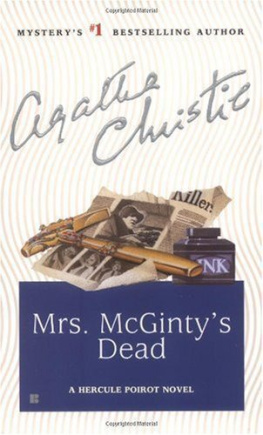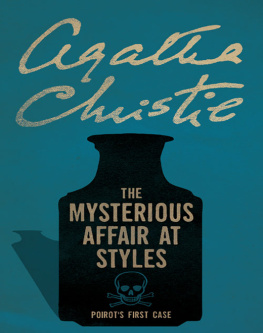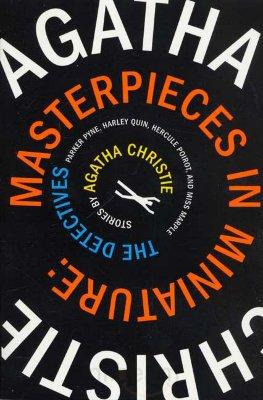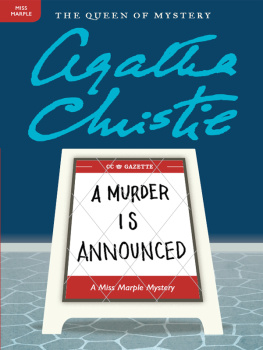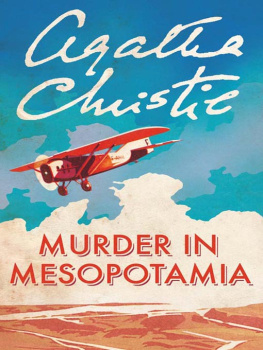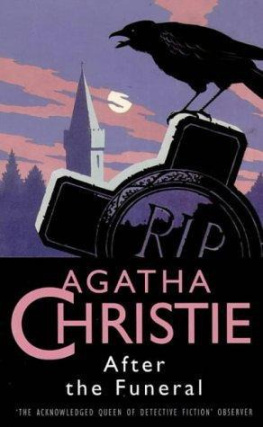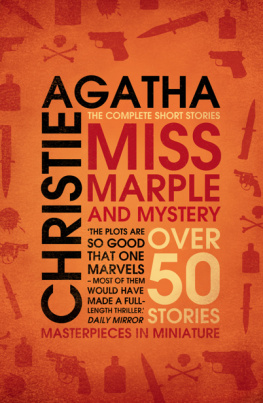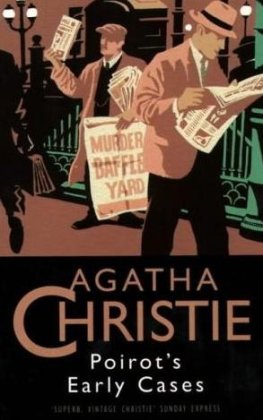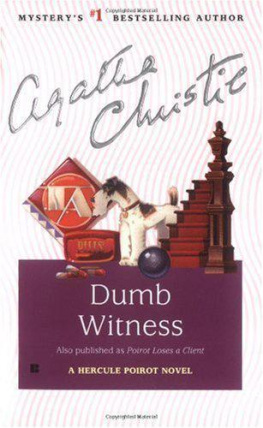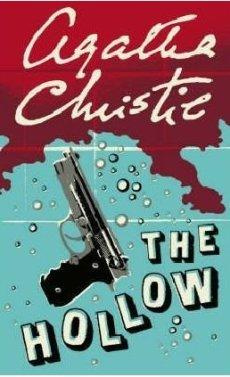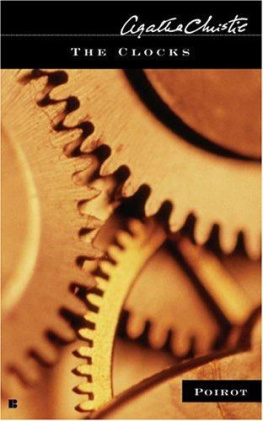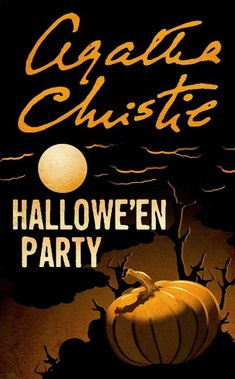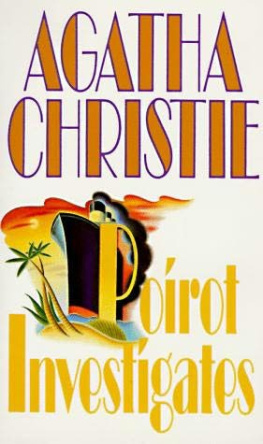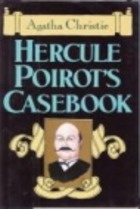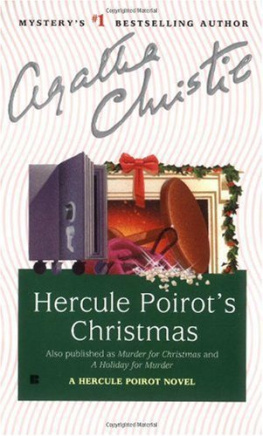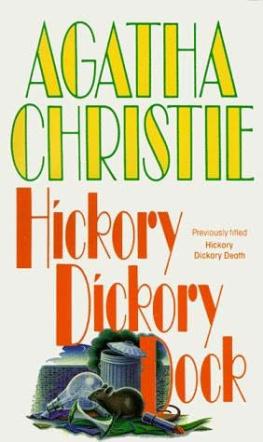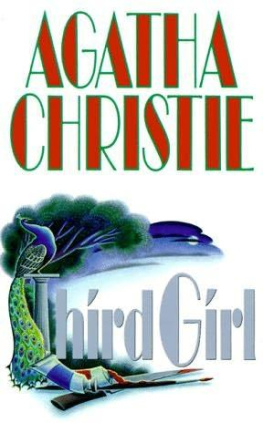MRS McGINTYS DEAD
Agatha Christie
Chapter 1
Hercule Poirot came out of the Vielle Grand'mre restaurant intoSoho. He turned up the collar of his overcoat through prudence,rather than necessity, since the night was not cold. "But at my age,one takes no risks," Poirot was wont to declare.
His eyes held a reflective sleepy pleasure. The escargots de laVielle Grand'mre had been delicious. A real find, this dingy littlerestaurant. Meditatively, like a well-fed dog, Hercule Poirot curledhis tongue round his lips. Drawing his handkerchief from hispocket, he dabbed his luxuriant moustaches.
Yes, he had dined well... And now what?
A taxi, passing him, slowed down invitingly. Poirot hesitated for amoment, but made no sign. Why take a taxi? He would in any casereach home too early to go to bed.
"Alas," murmured Poirot to his moustaches, "that one can only eatthree times a day..."
For afternoon tea was a meal to which he had never becomeacclimatised. "If one partakes of the five o'clock, one does not," heexplained, "approach the dinner with the proper quality ofexpectant gastric juices. And the dinner, let us remember, is thesupreme meal of the day!"
Not for him, either, the mid-morning coffee. No, chocolate andcroissants for breakfast, Djeneur at twelve-thirty if possible butcertainly not later than one o'clock, and finally the climax: LeDiner!
These were the peak periods of Hercule Poirot's day. Always aman who had taken his stomach seriously, he was reaping hisreward in old age. Eating was now not only a physical pleasure, itwas also an intellectual research. For in between meals he spentquite a lot of time searching out and marking down possiblesources of new and delicious food. La Vielle Grand'mre was theresult of one of these quests, and La Vielle Grand'mre had justreceived the seal of Hercule Poirot's gastronomic approval.
But now, unfortunately, there was the evening to put in.
Hercule Poirot sighed.
"If only," he thought, "ce cher Hastings were available..."
He dwelt with pleasure on his remembrances of his old friend.
"My first friend in this country - and still to me the dearest friend Ihave. True, often and often did he enrage me. But do I rememberthat now? No. I remember only his incredulous wonder, his open-mouthed appreciation of my talents - the ease with which I misledhim without uttering an untrue word, his bafflement, hisstupendous astonishment when he at last perceived the truth thathad been clear to me all along. Ce cher cher ami! It is myweakness, it has always been my weakness, to desire to show off.That weakness, Hastings could never understand. But indeed it isvery necessary for a man of my abilities to admire himself - and forthat one needs stimulation from outside. I cannot, truly I cannot, sitin a chair all day reflecting how truly admirable I am. One needsthe human touch. One needs - as they say nowadays - the stooge."
Hercule Poirot sighed. He turned into Shaftesbury Avenue.
Should he cross it and go on to Leicester Square and spend theevening at a cinema? Frowning slightly, he shook his head. Thecinema, more often than not, enraged him by the looseness of itsplots - the lack of logical continuity in the argument - even thephotography which, raved over by some, to Hercule Poirot seemedoften no more than the portrayal of scenes and objects so as tomake them appear totally different from what they were in reality.
Everything, Hercule Poirot decided, was too artistic nowadays.Nowhere was there the love of order and method that he himselfprized so highly. And seldom was there any appreciation ofsubtlety. Scenes of violence and crude brutality were the fashion,and as a former police officer, Poirot was bored by brutality. In hisearly days, he had seen plenty of crude brutality. It had been morethe rule than the exception. He found it fatiguing, and unintelligent.
"The truth is," Poirot reflected as he turned his steps homeward, "Iam not in tune with the modern world. And I am, in a superior way,a slave as other men are slaves. My work has enslaved me just astheir work enslaves them. When the hour of leisure arrives, theyhave nothing with which to fill their leisure. The retired financiertakes up golf, the little merchant puts bulbs in his garden, me, Ieat. But there it is, I come round to it again. One can only eat threetime a day. And in between are the gaps."
He passed a newspaper-seller and scanned the bill.
"Result of McGinty Trial. Verdict."
It stirred no interest in him. He recalled vaguely a small paragraphin the papers. It had not been an interesting murder. Somewretched old woman knocked on the head for a few pounds. Allpart of the senseless crude brutality of these days.
Poirot turned into the courtyard of his block of flats. As always hisheart swelled in approval. He was proud of his home. A splendidsymmetrical building. The lift took him up to the third floor wherehe had a large luxury flat with impeccable chromium fittings,square armchairs, and severely rectangular ornaments. Therecould truly be said not to be a curve in the place.
As he opened the door with his latchkey and stepped into thesquare, white lobby, his manservant, George, stepped softly tomeet him.
"Good evening, sir. There is a - gentleman waiting to see you."
He relieved Poirot deftly of his overcoat.
"Indeed?" Poirot was aware of that very slight pause before theword gentleman. As a social snob, George was an expert.
"A Mr Spence, sir."
"Spence." The name, for the moment, meant nothing to Poirot. Yethe knew that it should do so.
Pausing for a moment before the mirror to adjust his moustachesto a state of perfection, Poirot opened the door of the sitting-roomand entered. The man sitting in one of the big square armchairsgot up.
"Hullo, M. Poirot, hope you remember me. It's a long time...Superintendent Spence."
"But of course." Poirot shook him warmly by the hand.
Superintendent Spence of the Colchester Police. A very
interesting case that had been... As Spence had said, a long timeago now...
Poirot pressed his guest with refreshments. A grenadine? Crmede Menthe? Benedictine? Crme de Cacao...
At this moment George entered with a tray on which was a whiskybottle and a siphon. "Or beer if you prefer it, sir?" he murmured tothe visitor.
Superintendent Spence's large red face lightened.
"Beer for me," he said.
Poirot was left to wonder once more at the accomplishments ofGeorge. He himself had had no idea that there was beer in the flatand it seemed incomprehensible to him that it could be preferredto a sweet liqueur.
When Spence had his foaming tankard, Poirot poured himself out atiny glass of gleaming green crme de menthe.
"But it is charming of you to look me up," he said. "Charming. Youhave come up from?"
"Kilchester. I'll be retired in about six months. Actually, I was duefor retirement eighteen months ago. They asked me to stop on and
Next page
